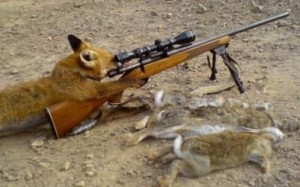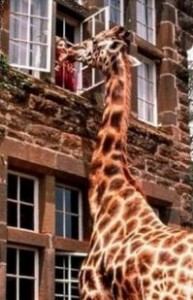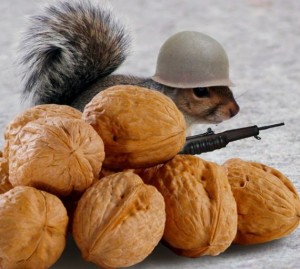Feeling frugal? Wondering how to save some money and time, while still eating healthy and helping the environment? Here are five animals showing us ways to eat less wastefully, saving time and money, while helping our health and the environment.
The Fox
Saves: money, environment, health
Lesson: Buy direct from the source
 By the time you buy a dozen eggs at the grocery store, they have been through several hands…and at least two weeks of handling, often three. By the time you finish that last egg, it might already be four weeks old. Not very fresh.
By the time you buy a dozen eggs at the grocery store, they have been through several hands…and at least two weeks of handling, often three. By the time you finish that last egg, it might already be four weeks old. Not very fresh.
The fox goes straight to the source – the henhouse. No middlemen adding extra prices. No back-and-forth-between-between-companies transportation adding extra pollution. No warehouse lay-overs reducing freshness. In many cases, no (or less) chemicals and hormones polluting your meal.
Pretty foxy strategy.
 The Giraffe
The Giraffe
Saves: money
Lesson: Check for cheaper items
Stores always place in front of your face the items that yield the biggest profits. These are the very things that a frugal-minded person least wants to be coaxed into buying.
The giraffe looks for less-obvious alternatives. His long neck reaches for higher leaves and items tucked out of sight on the top shelves.
Always stretch your neck a little to see if you can find a less-costly option.
The Bear
Saves: money, time, environment
Lesson: Buy in bulk
 Many people buy the same items week after week. This makes sense for milk and eggs; they would spoil if you buy them months in advance. But for many things, it makes no sense to make hundreds of trips to buy the same thing.
Many people buy the same items week after week. This makes sense for milk and eggs; they would spoil if you buy them months in advance. But for many things, it makes no sense to make hundreds of trips to buy the same thing.
The bear shops bulk. He doesn’t flit from flower to flower to collect honey; he waits for the bees to gather the nectar and churn out huge quantity of honey. This way, the bear needs go only once to collect a huge amount of honey all at once. When we do this, the item usually costs less, and we save time, money and pollution by reducing transportation.
Yeah – let someone else do the work.
READ ALSO: Three animals search high and low for a deal
READ ALSO: Get a $1000 Raise With Your Personal Fast Food Outlet
 The Spider
The Spider
Saves: money, time, environment, health
Lesson: Eat in
People seem to be eating out more and more. But restaurant food is usually much more fat-laden, sugar-stuffed and salt-infused than food made at home. It also costs much more. And it often takes longer to eat, when you consider transportation time, preparation and the inevitable waiting-for-the-bill ritual.
The spider never eats out. He waits for food to come to him, prepares it and devours it on the spot. He saves time, money and the risk of getting squished by a boot.
Eat in and enjoy the privacy and the savings.
The Squirrel
Saves: money, time
Lesson:Buy when there’s a surplus
 We buy things all year ’round, even things that could last quite a while. Apples and squashes are plentiful and cheap in the Fall, but keep well in a cool corner of the basement or garage for months. Some items are overstocked after Christmas. These are the times to buy.
We buy things all year ’round, even things that could last quite a while. Apples and squashes are plentiful and cheap in the Fall, but keep well in a cool corner of the basement or garage for months. Some items are overstocked after Christmas. These are the times to buy.
The squirrel does most of his shopping when the nuts are plentiful, then stores them away to eat over the course of the winter. This saves a lot of time that otherwise would be spent running around looking for food.
Why run from store to store, when the store can be right at home?



And the dog, useful for sitting around and stealing the resources of humans while doing little in the way of work.
Hilarious post.
so true. I love it.
Hi David,
Good insight of shopping. People really need to pay attention to these animals. They are smart shoppers. I love the way you bring this to our attention. Thanks
Debbie
This is a terrific post — both true and funny.
As an alternative health nut, I’d also include learning from the lion — eat lots of wild meat . . .
And from deer — eat lots of vegetables.
Stay away from grains and starches, including all wheat, corn, potatoes and rice.
What animals eat high glycemic carbohydrates? Birds and bugs. So if you don’t have a bird brain or six legs, avoid them.
You’ll have more energy (with which to earn more money), be healthier (to avoid medical expenses and lost productivity) and live longer (so your savings can compound longer).
This post ws also featured in http://canadianfinanceblog.com/2011/01/09/canadian-finance-carnival-18.htm
I hope you don’t have a stuffed fox and squirrel that you dress up in millitary out fits to take pictures of lol but it’s a great post.
I like the layout of the site and the way you speak…or write for that matter. I promise to come back.
Thanks for the post,
Aaron
Haha, you definitely need more picture of animals with guns
“And the dog, useful for sitting around and stealing the resources of humans while doing little in the way of work.”
True but would say this is more like a cat!
The Cat
Saves: money, time, effort
Lesson: Why do it yourself when a human will do it.
The cat has a very smart technique: Have all the freedom in the world and admirers that do your bidding!